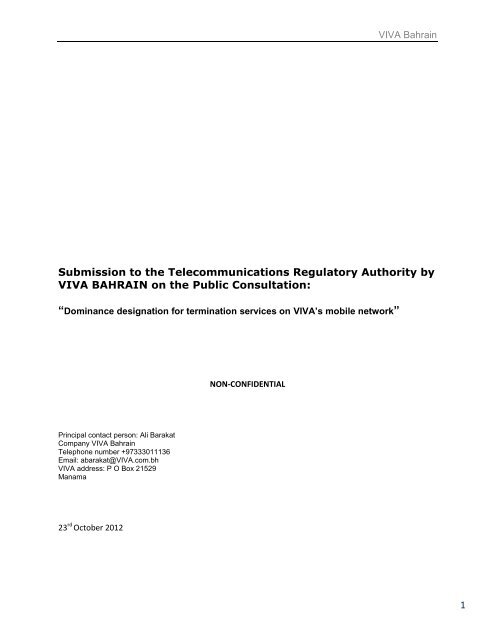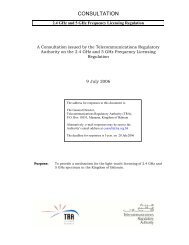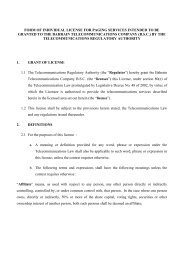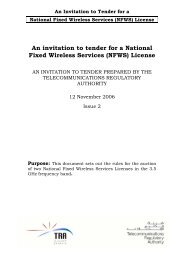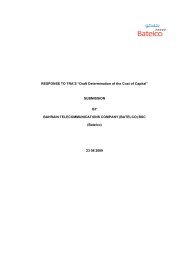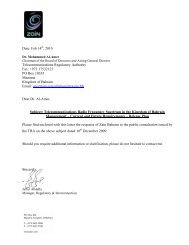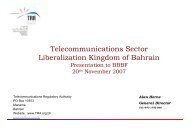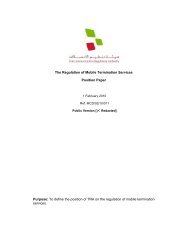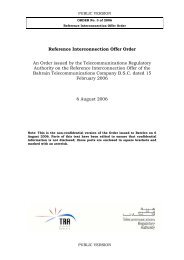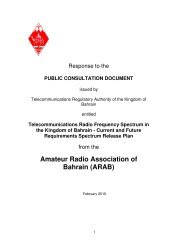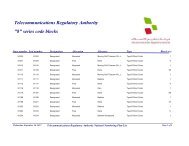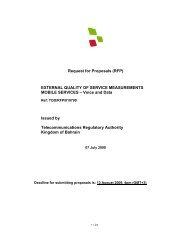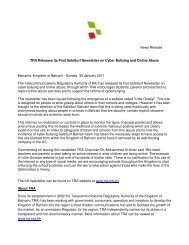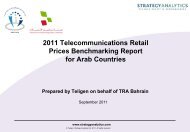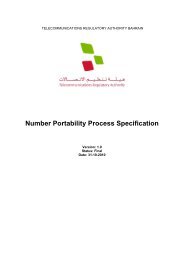Viva - TRA - Telecommunication Regulatory Authority
Viva - TRA - Telecommunication Regulatory Authority
Viva - TRA - Telecommunication Regulatory Authority
Create successful ePaper yourself
Turn your PDF publications into a flip-book with our unique Google optimized e-Paper software.
VIVA Bahrain<br />
Submission to the <strong>Telecommunication</strong>s <strong>Regulatory</strong> <strong>Authority</strong> by<br />
VIVA BAHRAIN on the Public Consultation:<br />
“Dominance designation for termination services on VIVA’s mobile network”<br />
NON-CONFIDENTIAL<br />
Principal contact person: Ali Barakat<br />
Company VIVA Bahrain<br />
Telephone number +97333011136<br />
Email: abarakat@VIVA.com.bh<br />
VIVA address: P O Box 21529<br />
Manama<br />
23 rd October 2012<br />
1
VIVA Bahrain<br />
1- Introduction<br />
VIVA welcomes the opportunity to comment on <strong>TRA</strong>’s review of the “Dominance designation for<br />
termination services on VIVA’s mobile network” consultation - MCD/08/12/115” issued on 30<br />
August 2012.<br />
VIVA agrees with the <strong>TRA</strong>’s market definition in relation to the wholesale supply of termination<br />
services on its mobile network, except for the inclusion of termination of international inbound<br />
calls and termination of domestic calls in the same market.<br />
As for the authority’s assessment and conclusion of VIVA dominance in relation to the wholesale<br />
supply of termination services on its mobile network, VIVA disagrees with the <strong>TRA</strong>’s position.<br />
VIVA is concerned about the unequal treatment by the <strong>TRA</strong> since that the second mobile entrant<br />
has enjoyed a very lengthy period without any dominance designation on its own network and<br />
its reference offer is yet to be published even after the designation announced in February<br />
2010.<br />
Additional comments are attached in our response to the specific questions.<br />
2- VIVA response to Question 1:<br />
2.1- Please provide comments on the <strong>Authority</strong>’s preliminary view on market definition in relation<br />
to the wholesale supply of termination services on VIVA’s mobile network<br />
VIVA does not agree with the <strong>TRA</strong>’s view in paragraph 64 that “from a market definition<br />
perspective, the termination on a particular mobile network of domestic and international<br />
inbound FTM and MTM calls are the same”.<br />
VIVA believes that the two terminations shall not be considered in the same market since:<br />
1- They are not substitutable<br />
2- Their cost structure is not the same, and<br />
3- The international wholesale customers interested by the Bahraini termination services are<br />
not operating in the Bahraini market and as such shall not be subject to the same regulation<br />
as applied to domestic wholesale customers.<br />
From a costing perspective international originating calls involve more resources than domestic<br />
originating calls, such as the international gateway, the international transmission capacity, the<br />
landing station and the backhauling capacity.<br />
Since the ultimate aim of regulation is to improve consumers’ welfare, the regulation of<br />
international termination will not have any benefit to Bahraini consumers but to foreign<br />
carriers. Aligning international termination with local termination will have a significant negative<br />
2
VIVA Bahrain<br />
financial impact on the Bahraini economy. VIVA has estimated the loss to the Bahraini economy<br />
to exceed 10 Million BD per year, which is kept with foreign operators.<br />
The best example which supports VIVA position is the regulatory position of the EC which is<br />
regulating the roaming charges (Inter Operators Tariff - IOT) among EU countries but does not<br />
intervene in the IOT charged by EU carriers to other international mobile customers roaming in<br />
the EU zone. In the latter case IOTs are much higher than those applied between EU countries.<br />
In February 2012, VIVA did share its position with the <strong>TRA</strong> on the subject arguing especially that<br />
a price floor aligned with the GCC Council resolution, i.e. 37.65 fils for mobile termination and<br />
30.12 for fixed termination, shall be set for international termination to Bahrain and expanded<br />
to all originating countries.<br />
3- VIVA response to Question 2 and 3:<br />
2.2- Please provide comments on the <strong>Authority</strong>’s preliminary assessment of VIVA’s dominance in<br />
relation to the wholesale supply of termination services on VIVA’s mobile network<br />
2.3- Please provide comments on the <strong>Authority</strong>’s preliminary conclusion that VIVA is dominant in<br />
relation to the wholesale supply of termination services on VIVA’s mobile network.<br />
VIVA disagrees with the authority’s early assessment and proposal to designate VIVA as<br />
dominant in relation to the wholesale supply of termination services on its mobile network<br />
because of the following:<br />
<br />
VIVA as a third entrant in a mature competitive market with established operators (that<br />
have reached 120% mobile market penetration at the end of 2009), trying to build and<br />
stabilize its market share, has no bargaining power to deal on interconnection with its<br />
competitors. Since its launch VIVA was constrained to a form of termination reciprocity by<br />
its competitors, who imposed symmetric termination rates. This has not been the case in<br />
the interconnect market between existing operators before the entry of VIVA.<br />
At the time when the <strong>TRA</strong> issued the determination for dominance of Zain in February 2010,<br />
the MTRs on Zain network applicable to OLOs were between 21% and 36% higher than<br />
those paid to Zain by Batelco. Even though VIVA mobile termination rates are not regulated<br />
VIVA has not applied higher rates.<br />
<br />
The telecommunication market trends during the period from 2003 to 2011 show that Zain<br />
market share was growing steady starting at xx% at the end of 2004 and up to almost xx%<br />
during 2008 and 2009. During a period of seven years the <strong>TRA</strong> has not announced any<br />
dominance designation for Zain in relation to the wholesale supply of termination services<br />
3
VIVA Bahrain<br />
<br />
on its mobile network. Since VIVA is committed to apply symmetric termination rates with<br />
OLOs, VIVA would like to be treated at a non-discriminatory basis.<br />
Only during 2010, <strong>TRA</strong> designated Zain as dominant on its mobile network in relation to the<br />
supply of wholesale termination services. However, till date and after two years of<br />
announcing its dominance designation the relevant reference offer is still not published yet.<br />
<br />
The entry of VIVA in the Bahraini telecom market has broken the implied duopoly between<br />
Zain and Batelco and significantly stimulated the market dynamics and competition to the<br />
benefit of consumers. VIVA has probably gained market share in terms of subscribers more<br />
rapidly than the second entrant did, but at the expense of a revenue share. Additionally,<br />
VIVA has targeted the mass market which is very price sensitive and hence very volatile and<br />
its market share could change over short periods of time.<br />
<br />
VIVA believes that a relatively high customer-based market share does not necessarily imply<br />
market power. Revenue-based market share reflects more accurately the market power of<br />
competitors rather than subscribers-based market share. To ensure a sustainable<br />
competition VIVA believes that new entrants shall benefit a reasonable time frame to<br />
stabilize and diversify their customer base before being submitted to heavy regulatory<br />
unjustifiable remedies.<br />
<br />
VIVA as a new entrant is facing start up expenditures that existing operators do not face<br />
such as heavy CAPEX to deploy its network and service delivery platforms. The<br />
implementation of a costing regulatory system will create an unduly significant regulatory<br />
burden on VIVA at this early stage of its operations. In this regard the <strong>TRA</strong> shall ensure that<br />
the cost, complexity and timeframes for regulatory conditions are achievable by new<br />
entrants where the burden of regulation could become a barrier to competition.<br />
<br />
The different position between VIVA as a new entrant and the existing network operators in<br />
terms of stable installed customer base, reputation and quality of service creates an<br />
asymmetric market environment that justifies non-regulated termination charges for the<br />
mid-term and which is in line with the earlier practices that the <strong>TRA</strong> implemented for Zain.<br />
<br />
In this regard the European <strong>Regulatory</strong> Group has assessed the need for a special regulatory<br />
treatment of new entrants: “NRAs will have to formulate expectations about a reasonable<br />
period of time until when the price of the entrant may become regulated according to the<br />
general regulatory approach to the sector, taking into account the competitive situation in<br />
the markets. … Although it might be justified in the light of the goal of sustainable<br />
competition that new entrants are treated differently, the long run goal is to ensure that all<br />
operators are producing efficiently” 1<br />
1 Revised ERG Remedies Common Position (ERG (06) 33 of June 2006, p. 113.<br />
4
VIVA Bahrain<br />
VIVA has not reached yet the level of optimum production despite its relatively customer<br />
base, which does not reflect any market power, especially considering the volatility of the<br />
prepaid segment and low profitability, the high depreciation and amortization charges and<br />
the high customer acquisition cost, which is commonly considered as the most frequent<br />
cause of startup failure.<br />
<br />
<br />
<br />
Considering VIVA early development, new remedies/obligations have a high cost in terms of<br />
compliance cost especially considering the myriad obligations that it has to fulfill and the<br />
multiple work-plans streams that VIVA is currently engaged in with the <strong>TRA</strong>. VIVA is<br />
concerned that increasing such costs will significantly impact our ability to be supportive and<br />
responsive to the needs of the <strong>Authority</strong>.<br />
Finally, VIVA considers that the ultimate aim of the present dominance determination is to<br />
mandate cost based termination rates and non-discriminatory interconnect conditions to<br />
ensure fair competition and eliminate inefficiencies. This objective is already factually<br />
committed and reached by VIVA since its launch, and to the benefit of its competitors as the<br />
interconnect traffic flow is far from being balanced. Since this legitimate aim has been<br />
already met, any additional remedy employed to achieve the aim and ultimately to promote<br />
competition must be both necessary and the least burdensome.<br />
VIVA does not believe that currently there is a risk of abuse of dominance from VIVA for the<br />
termination services on its network.<br />
4- Conclusion<br />
VIVA welcomes the <strong>TRA</strong> initiatives to consult the industry about the review of telecom markets.<br />
However, VIVA is in disagreement with the <strong>TRA</strong>’s position to include international inbound<br />
termination in the same market as domestic termination, and with the timing to designate VIVA as<br />
dominant on its own network.<br />
Treatment of local termination and international the same does not bring any Bahrain consumer<br />
benefit and in fact prevents an economic opportunity for Bahrain.<br />
On dominance designation, VIVA believes that the <strong>TRA</strong> should ensure a non-discriminatory<br />
treatment of all operators and proportionate regulatory measures in reviewing the competitive<br />
conditions of telecom markets. The <strong>TRA</strong>’s proposal shall be in line with best practices and ensure a<br />
fair playing field and promote sustainable competition considering:<br />
1. The principle of non-discrimination treatment that the <strong>TRA</strong> is committed to apply among all<br />
operators, and similar to the treatment to Zain on a similar topic<br />
5
VIVA Bahrain<br />
2. The commitment of VIVA since its launch to apply symmetric termination conditions, and<br />
hence no remedy is needed<br />
3. The different competitive position of VIVA as a third entrant in the mobile market in terms<br />
of economies of scale and scope, reputation, spectrum allocation, etc.<br />
6


